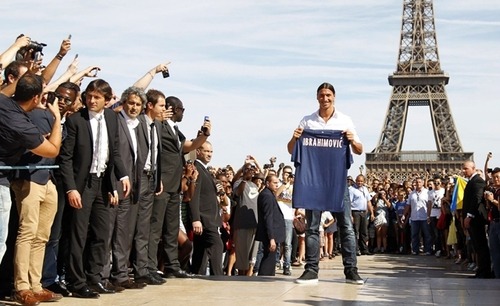Soothing Europe’s debt woes: oil millions and inflated wages
Soothing Europe’s debt woes: oil millions and inflated wages


Football is ofttimes accused of self-serving megalomania. These accusations aren’t necessarily baseless – while FIFA and it’s regional tributaries do give back, they do so somewhat disproportionately to their behemoth fiscal inflows (see here). It can be argued though, that once in a while, football contributes to economic improvement in a side effect capacity. World Cups and European Championships tend to, like the Olympics, engage workforces in bruising multi-year structural endeavours; upheavals of transportation systems and the erections of stadiums spring to mind, followed by bouts of anticipatory and in-tournament tourism.
Hotels pay taxes, as do the sole proprietors and brewers whose quarterly earnings are handsomely bloated by FIFA and/or UEFA action. Of course, these are merely the side effects of football’s competitive brainchildren. If domestic fiscal policy is aided by the right to host these events, football’s pockets are aided and then given a soothing massage by the gold-plated hands of a platitude of hulking multinationals.
On a microcosmic footballing level, we have clubs and players, also ofttimes accused of self-serving megalomania (at least there is a consistency in this sport). Many of these are privately owned, usually by a variety of tycoon (oil tycoons, sport tycoons, cyberspace tycoons, Wall Street tycoons, even chicken-farm tycoons – let’s call them the 1%). Once more, the reasons behind the neoteric ‘let’s-buy-a-football-club’ revolution are of the rapacious sort. There is money in football, and lots of it.
There is no money in Europe, though. Economies are shadowed by the doom of grotesque debt-to-GDP ratios, high unemployment, rising taxes and rousing interest rates. The future is murky.
Rise, then, the knights in shining armour. Dressed in keffiyeh and thawb, the seemingly financially frivolous sheikhs of the Middle East have declared their presence in cities like Getafe, Málaga, Manchester and Paris. Americans are scattered too, from Liverpool to Rome, and there is the obvious littering of domestic billionaires, like Berlusconi (Milan), Lewis (Tottenham) and Perez (Real Madrid). While their cash-pouring is primarily intended to reap benefits for their Salvatore Ferragamo pockets and Louis Vuitton wallets, football has the aforementioned, comfortably uncanny propensity to distribute a positively-laced side effect.
Europe’s economies need money. It is an indirect method of financial aid, but through an inflationary distortion in player values and wages, the 1% of football is acting as a government’s dream. Take Paris Saint-Germain, owned in its entirety by the Qatar Investment Authority, who have seduced the likes of Javier Pastore, Thiago Silva, Carlo Ancelotti and Zlatan Ibrahimovic to the French capital, as an example. Having spent over €200m in club and player acquisition, the wages being paid to their stars are soon to be met with President François Hollande’s 75% income tax rate on those earning in excess of €1m-a-year. Ibrahimovic’s pre-tax salary is rumoured to be in the region of €35m annually (with the government reaping €21m), to which the French minister Benoît Hamon responded “I am over the moon that Ibrahimovic is going to pay his taxes in France”. Cue similar celebrations in the nations of other football-fueled tax receipts.
Many lament the cultural negativity of clubs being owned by voracious foreigners, but in the impecunious eurozone’s current cataclysmic budgetary climate, foreign cash injections, whatever the incentive, are a welcome palliative. Europe needs football, in all its self-serving megalomania.
Darshan Joshi has made his emphatic return to AFR, and we’re happy to have him back. You can follow him on Twitter at @thedarshan.







